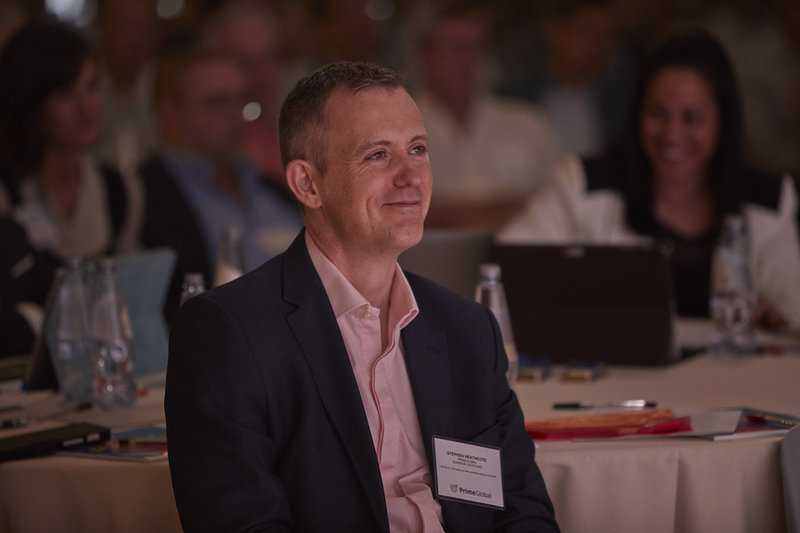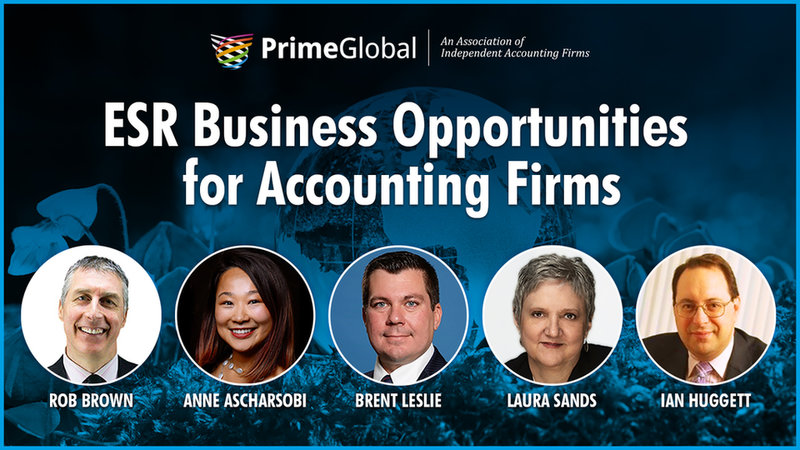Thought Leadership: ESG
How can accountancy firms help save the planet?
The focus on addressing the existential threat of climate change has dramatically increased. President Biden has set an aggressive commitment to slash US greenhouse gas emissions in half by 2030. The UK government is pledging to cut emissions by 78% by 2035. This will inevitably lead to new regulation and increased business disclosure and reporting. Steve Heathcote, CEO, PrimeGlobal comments

M
arket forces are also increasing the pressure on businesses as consumers are choosing products and services based on their perception of a company’s environmental impact. The next generation expects their employers to act.
The impact of these forces will not be restricted to the largest companies. 90% of global economic activity is generated by small businesses. To achieve their targets, Governments will need small businesses to respond.
Who will help businesses, of all sizes, tackle climate change? Step forward - accountancy firms.
Accountancy firms speak to all businesses, they are trusted advisers, they are expected to provide leadership. How will accountancy firms ensure they are ready to advise clients on their environmental impact? What can they practically start to do to help their clients?
On Earth Day (an annual event to raise awareness of climate change on 21 April, 2021), PrimeGlobal held a panel discussion to provide practical support to help accountancy firms. The panel included firms leading the way with providing environmental services, and support, to their clients. With attendees from all round the World including the US, France, Netherlands, Australia, UK, Cameron, Afghanistan, Pakistan, Uganda, and China, it really demonstrated the global opportunity for the profession to make a difference.
Accounting firms are needed
Brent Leslie, a partner at the US firm Berkowitz Pollack Brant, notes that stakeholder reporting has been broadening for some time. Leslie explains that “we have moved from a focus on shareholders to a wider consideration of a companies’ stakeholders with company reporting extending to employers, customers, and environmental and social impact. Accounting firms need to provide advice to help businesses prepare these reports. There is also increasing demand to demonstrate that the reports can be relied on through external verification provided by independent firms.” Leslie recognises that, at present, in the US it is still mainly larger companies that are impacted. However, he expects a cascade to smaller companies in the next few years through supply chains, competitive responses, and strong consumer demand.
Ian Huggett, partner from UK firm Thomas Westcott, comments that clients are very aware of the focus on reducing carbon emissions. However, they often do not know where to start. Huggett states that “starting the conversation is critical, taking manageable steps makes a difference. The goal is to help clients chip away at emissions. The cumulative impact will be meaningful.”
Anne Ascharsobi, Director of Social and Environmental Impact at Xero which supports over two million subscribers – many of which are small businesses and accountancy firms, believes that there is “an advisory opportunity for accountancy firms. Firms have an opportunity to demonstrate that they can provide proactive valuable advice to help businesses become more sustainable. This will help accounting firms distinguish themselves from other service providers.”
Laura Sands, principal at US firm K-coe Isom, highlights that firms can help clients by using dashboards and technology to better track their environmental impact. “We have captured over 10,000 Key Performance Indicators to help clients assess how they compare to other comparable organisations,” she says.

Steve Heathcote, CEO, PrimeGlobal. Credit: PrimeGlobal
Steps to get ready
Leslie says that the important first step for an accounting firm is to begin a conversation with clients. “Its not only about the environmental impact of the client’s business. It is also important to consider the social side as well. How is the company having a positive impact on wider society, for example, through its community work? It’s the total picture of what the company stands for that is important.”
To help with these conversations, Sands explains that a great starting point is for a firm to develop its own environmental and social report. “Developing our own report helped us learn how to measure our environmental impact and created engagement across the wider firm. These lessons were extremely valuable to share with clients”.
PrimeGlobal shares our firms’ environmental and social reports to help promote these good practices.
Huggett says that firms do need to build up their knowledge to have meaningful conversations with their clients. Sands comments that, ‘You will be surprised how much talent and knowledge is out there. We have expertise covering environmental science, data science, accounting knowledge and, of course, deep industry knowledge. Our team comes together to provide quality advice to our clients.”
“There may not be enough demand to hire a specific person to provide clients with environmental services. Firms should, however, still build up their knowledge and understanding to support conversations. Generation Z members of the team are often keen to get involved. However, leadership from the top is critical. Partners must be visibly committed,” says Huggett. Leslie agrees, “clients even need help through the terminology, carbon neutral, net zero, carbon negative, all sound the same; however, they are actually very different.”
Leslie says that “There is no roadmap that firms can follow to help clients prepare environmental and social reports. It is not like financial reporting standards which are well established. They need to work with clients as they go. When our firm was asked to provide assurance over its first environmental assurance report it worked through the best approach and put in place the right capability. We knew we had the ability to figure it out”. Huggett agrees, “We know how to work like this as accounting firms. We need to be agile, creating solutions which meet specific needs. We do not need to wait for a rule book.”

ESR Business Opportunities for Accounting Firms. Credit: PrimeGlobal
Helping clients
Accounting firms can provide a range of support to their clients. Environmental impact might be considered as part of current services. “All audits should include consideration of the impact of social and environmental risk. Social media can quickly escalate accusations that can seriously damage a company’s reputation. Environmental and social reports help a company respond by highlighting the positive impact of what they do,” says Leslie.
Huggett comments that tax advice will be increasingly important as governments incentivise businesses to become more sustainable. He suggests a five-point plan to help clients get on the road towards reducing carbon emissions: 1) Understand their carbon footprint, 2) Evaluate the risks of not reducing emissions, 3) Identify measures, 4) Develop a plan to reduce emissions and 5) Do it!
Ascharsobi notes in the UK, on theXero App Marketplace, there is an app partner to help small businesses start calculating their carbon emissions footprint and have access to offset opportunities. Xero would love for more environmentally focused app partners to join their ecosystem, so please get in touch at socialimpact@xero.com if you are interested!
Sands says that environmental and social reporting will become widespread and develop into their own service lines, so firms need to take steps now to build experience and be able to provide assurance on these reports when asked. Standards such as the United Nations sustainability goals provide an effective framework to advise clients. For example, PrimeGlobal member firm Eshuis, from the Netherlands, helps its clients assess themselves against the UN goals.
The future
Leslie comments that investment houses are increasingly focused on companies Environment Social Governance (ESG) ratings. This will ultimately increase pressure on all businesses to react.
Ascharsobi agrees noting that for Software-as-a-service and IT companies as an example, “in addition to profitability, investors are looking closely at our climate change strategy and impact, diversity & inclusion, cybersecurity policies, and data privacy and protection practices, to ensure we are running a business set up for near and long term success.“ With the continued focus on financial and non-financial measures, businesses will ultimately want to work with one firm which can ideally provide support on both sets of measures,” she says. It is, therefore, essential for accounting firms to start considering what role, if any, environmental measures have in their practice alongside more traditional financial information.
Sands says, “Don’t delay, its essential not only for your existing clients, but for your future clients as well. The pedal must be to the metal.”
With a global set of high-quality sustainability standards on the way, under the oversight of the IFRS Foundation, the move to widespread environmental reporting is likely to increase massively in the years ahead.
All firms on the panel agree that this is not going away, all accounting firms need to consider the opportunities. They also highlight that they are developing profitable service lines around helping clients with their environmental impact. As Ascharsobi says “Doing the right thing, also means being the most profitable over the long run.” Even more sceptical partners will recognise the significant opportunities for firms. Leslie notes “the risks of not talking to your clients about this are far bigger than starting the conversation. Your clients do not want to be left behind by their competitors.”
I am very proud that many of our PrimeGlobal firms are leading the way with helping businesses, of all sizes, improve their environmental impact. It is not often accounting firms can do something they can be genuinely proud of and ensure the long-term success of their firms. I hope the entire profession embraces this opportunity as professional accountants clearly have a critical role to save the planet.